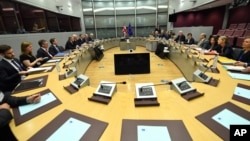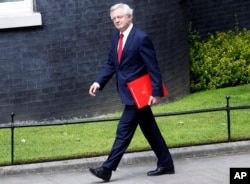Representatives from Britain and the European Union are meeting Monday in Brussels to begin the complicated process of negotiating Britain's exit from the EU.
The talks come about one year after voters in Britain narrowly decided to make the move.
Top British negotiator David Davis said his side is starting the process with a "positive and constructive tone," and that "there is more that unites us than divides us."
The lead EU negotiator, Michel Barnier, said his priority is to clear up "uncertainties caused by Brexit."
Officials on both sides play down expectations for what can be achieved in one day. EU diplomats hope this first meeting, and a Brussels summit on Thursday and Friday where May will encounter - but not negotiate with - fellow EU leaders, can improve the atmosphere after some spiky exchanges.
"Now, the hard work begins," Davis said, adding he wanted a deal that worked for both sides. "These talks will be difficult at points, but we will be approaching them in a constructive way."
Barnier, a keen mountaineer, spent the weekend in his native Alps "to draw the strength and energy needed for long walks". Davis's agreement to Monday's agenda led some EU officials to believe that May's government may at last coming around to Brussels' view of how negotiations should be run.
Which Brexit?
May's election debacle has revived feuding over Europe among Conservatives that her predecessor David Cameron hoped to end by calling the referendum and leaves EU leaders unclear on her plan for a "global Britain" which most of them regard as pure folly.
While "Brexiteers" have strongly backed May's proposed clean break with the single market and customs union, finance minister Philip Hammond and others have this month echoed calls by businesses for less of a "hard Brexit" and retaining closer customs ties.
With discontent in europhile Scotland and troubled Northern Ireland, which faces a new EU border across the divided island, Brexit poses new threats to the integrity of the United Kingdom.
It will test the ingenuity of thousands of public servants racing against the clock to untangle 44 years of EU membership before Britain is out, 649 days from now, on March 30, 2019. For the officials sitting down on Monday, at least on the EU side, a major worry is Britain crashing out into a limbo, with no deal.
For that reason, Brussels wants as a priority to guarantee rights for 3 million EU citizens in Britain and be paid tens of billions of euros it says London will owe on its departure.
With a further million British expatriates in the EU, May too wants a deal on citizens' rights, though the two sides are some way apart. Agreeing to pay a "Brexit bill" may be more inflammatory.
Brussels is also resisting British demands for immediate talks on a future free trade arrangement. The EU insists that should wait until an outline agreement on divorce terms, ideally by the end of this year. In any case, EU officials say, London no longer seems sure of what trade arrangements it will ask for.
But Union leaders, including German Chancellor Angela Merkel and French President Emmanuel Macron, are also determined not to make concessions to Britain that might encourage others to follow.
When 52 percent of British voters opted for Brexit, some feared for the survival of a Union battered by the euro crisis and divided in its response to chaotic immigration. The election of the fervently europhile Macron, and his party's sweep of the French parliament on Sunday, has revived optimism in Brussels.
Britain and the EU have until the end of March 2019 to reach an agreement and have it ratified by parliaments in the remaining EU member states.
Some material for this report came from Reuters.






